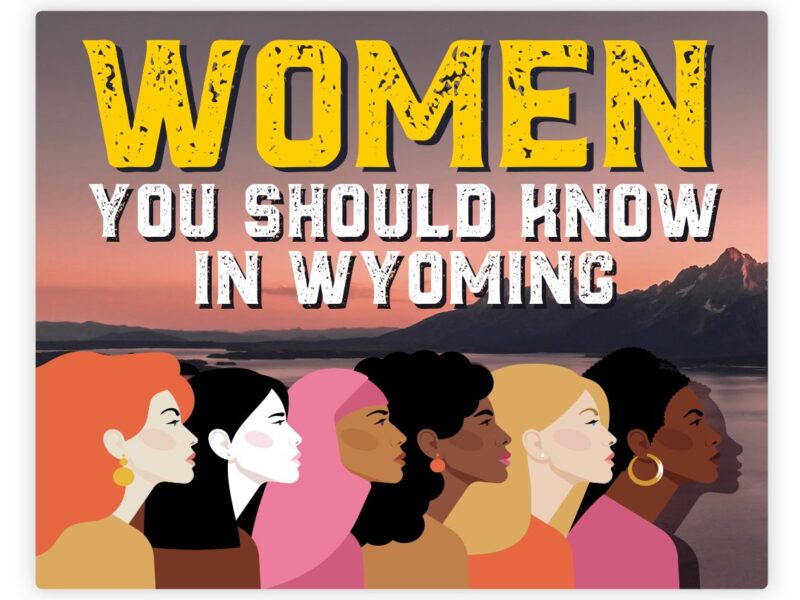WOMEN YOU SHOULD KNOW IN WYOMING: Meeteetse Rancher Embraces Rugged Lifestyle
Ronee Hogg sees rewards, challenges of ranching in northwest Wyoming
- Published In: Other News & Features
- Last Updated: May 03, 2023

By Elizabeth Sampson
Special to the Wyoming Truth
Making a living as a Wyoming rancher isn’t for the weak: from the face-freezing wind of calving season to the stomach-souring price of hay, not everyone is cut out for the challenge.
But for one Wyoming woman, nothing could replace the happiness of the ranch life—and the ranching business.
Ronee Hogg, 61, has been involved with ranching for most of her life. She and her sons own Hogg’s Black Diamond Cattle in Meeteetse, a small town surrounded by the sagebrush-covered rolling hills at the base of the Absaroka Mountain Range.
The landscape and the work itself combine to create the life Hogg cherishes.

“I wouldn’t have wanted a different lifestyle, there’s just no way,” she said. “In the springtime you get up and it’s 30 or 40 degrees, the sun is out, the birds are chirping, the calves are running around happily, fighting each other, playing. The scenery is just awesome. It’s the tranquility.”
Her favorite time of year is early June though, because it isn’t too hot, and it isn’t too cold and the cows are out on their summer range.
“The last few years it’s been pretty warm and dry, but when that thunderstorm rolls through and you smell that rain, it’s just indescribable,” she said.
Hogg’s ranch life affords her an up-close look at Wyoming wildlife other people may not regularly view: black bears, mountain lions and bobcats. But last summer was the first time she saw a grizzly bear.
“This last spring before we turned out, I went up to our summer pasture to make sure all the gates were shut between me and the neighbors, and I saw my first sow with her cub,” Hogg recalled. “My granddaughter and I were taking salt out three or four weeks later, and I saw a big old black boar grizzly. Then I saw one eating on a dead cow….That’s the first time I’ve ever seen them.”
Range life
Hogg was born in Roswell, New Mexico, to parents who were from Ten Sleep, and when she was in fifth grade, they moved to the Meeteetse area. Both of Hogg’s parents came from ranching families, so she spent part of her childhood helping to brand and move cattle or working with sheep.
Fresh out of high school in 1980, she married John Hogg and moved to his family ranch. He passed away in 2011, and Hogg carried on ranching. She now works in a partnership with her two sons, Michael, who lives on the ranch, and Kurt, who also works for an oil company.
The Hoggs run 250-260 Angus-cross cattle and raise show calves for kids in 4H or FFA. Hogg also maintains a registered Angus herd, which requires her to track each calf’s ancestry and file paperwork with the American Angus Association.
Hogg sells yearling Angus bulls each spring at the Northwest Wyoming Angus Association Auction in Riverton. Her commercial herd calves are typically born in March, and then sold in August to feedlots in Wyoming, Nebraska, Kansas, Montana and Missouri.
Hogg does a little bit of everything on the ranch, from bookkeeping to in-the-pen work like checking for and doctoring sick animals each morning, looking in on calving mothers in the night and pulling calves who are struggling to be born.
Hogg’s family started calving season in mid-January, and this year’s extreme winter weather made calving extra difficult.
“When we see they are getting close to calving, we bring them in the corral, and we check them,” she said. “If it is cold and nasty like it was this year, it was every hour on the hour.”
She explained that freezing temperatures make it difficult for the newborn calves to stand up and start nursing.
“If they get up and start sucking, then they are going to be OK, but when it is cold and nasty, they won’t get up, and they will freeze to death,” Hogg said.
While freezing temperatures are always problematic, this past winter has been extra challenging for ranchers.
“We’ve never had snow sit here on the ground from the middle of October,” she said. “You have cows slipping on ice, they abort their calves. You have calves break legs, you have cows break legs. It’s been one of those horrible years.”
The difficult economy creates another struggle for ranchers. Hogg’s biggest issue is feed for the cattle. In the summer and fall, the herd happily grazes on grass, but in the winter and spring, cattle eat hay, and prices are soaring.
“This is the most expensive it’s ever been,” she said. “We’ve bought hay anywhere from $145 to $275 [per ton], but we paid $285 [per ton] for 100 ton of hay this year.”
Even though beef consumers are seeing high prices for steak in the grocery store—up to $9 per pound for a T-bone—cattle producers are not realizing that amount per pound. Last fall, Hogg’s cattle brought in around $1.65 per pound at auction.
Wearing many hats
Despite these challenges, Hogg’s success comes down to knowing her herd. She pays attention to characteristics like temperament and calf size as she determines which cows to continue breeding.
“You’ve got to be picky and choosy on what you breed to and who you breed to,” Hogg said. “I think I’m doing pretty good, because what bulls I do not sell in the spring get turned into our commercial herd, and we averaged over 600-pound calves every year for the last seven years.”
In addition to ranching, Hogg has worked as the deputy clerk for the town of Meeteetse since 2008. Her coworker, clerk treasurer Angie Johnson, said that the same organizational skills Hogg uses on the ranch enable her to excel at her municipal job.
“During calving season or branding or vaccinations, she is the organizer of the activity —she organizes all of it: ordering vaccinations, all that’s involved,” Johnson said. “That’s very integral to the way you do business for a municipality—those organizational skills.”
Johnson, who has known Hogg most of her life, said that Hogg values giving back to their small town in other ways, too.
“Ronee is not just a rancher, and she’s not just the deputy clerk,” Johnson said. “She’s always been very integrally involved in the school—as an official, as a coach, she does the books. She is very proud to be a Longhorn.”
Hogg doesn’t plan to retire from ranching any time soon—she loves it too much. Though ranching may bring to mind images of rugged cowboys, Hogg knows firsthand that women can do the work, too.
“I don’t think there’s any difference between men and women in the ranching business,” she said. “It just depends on how much heart you have for it.”













